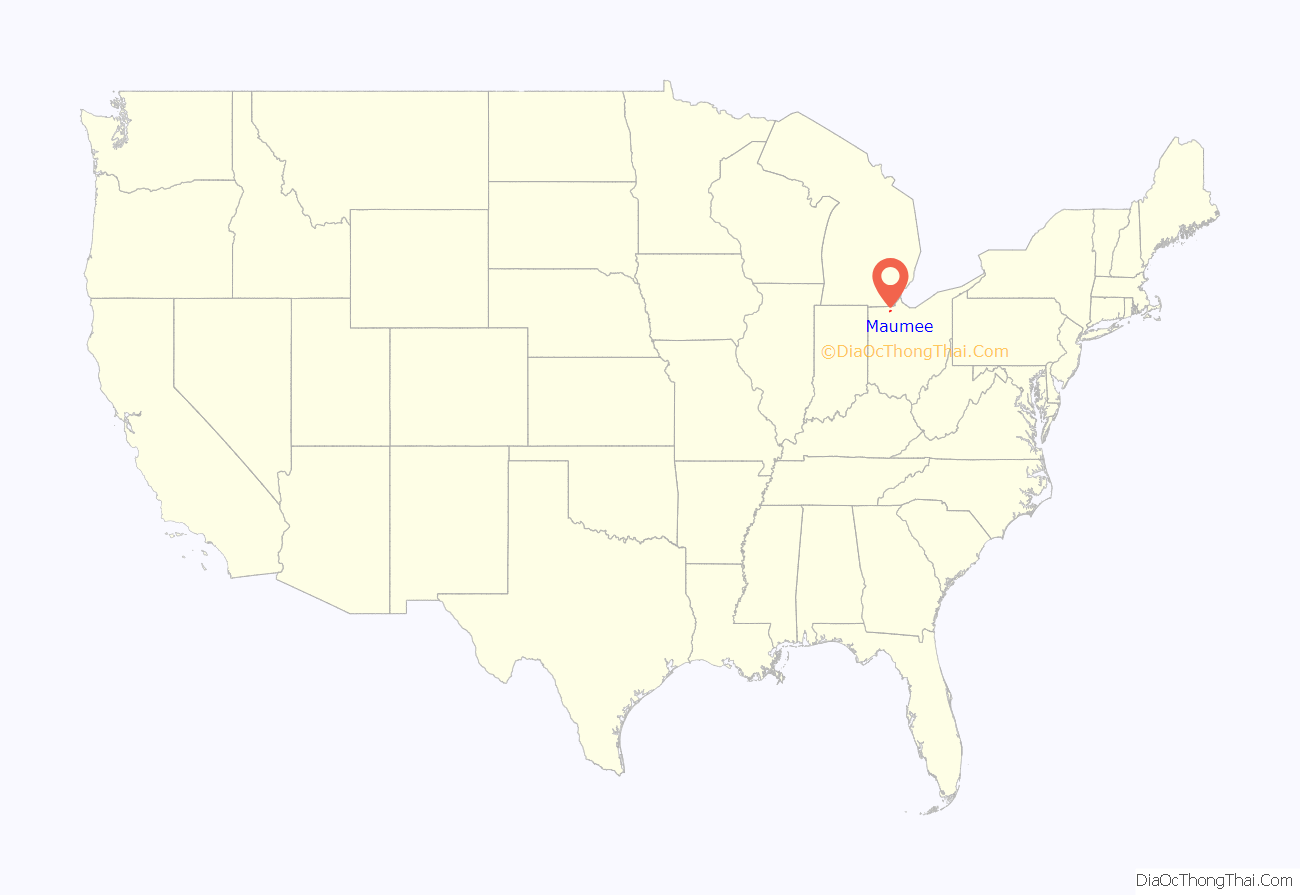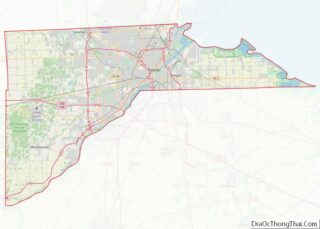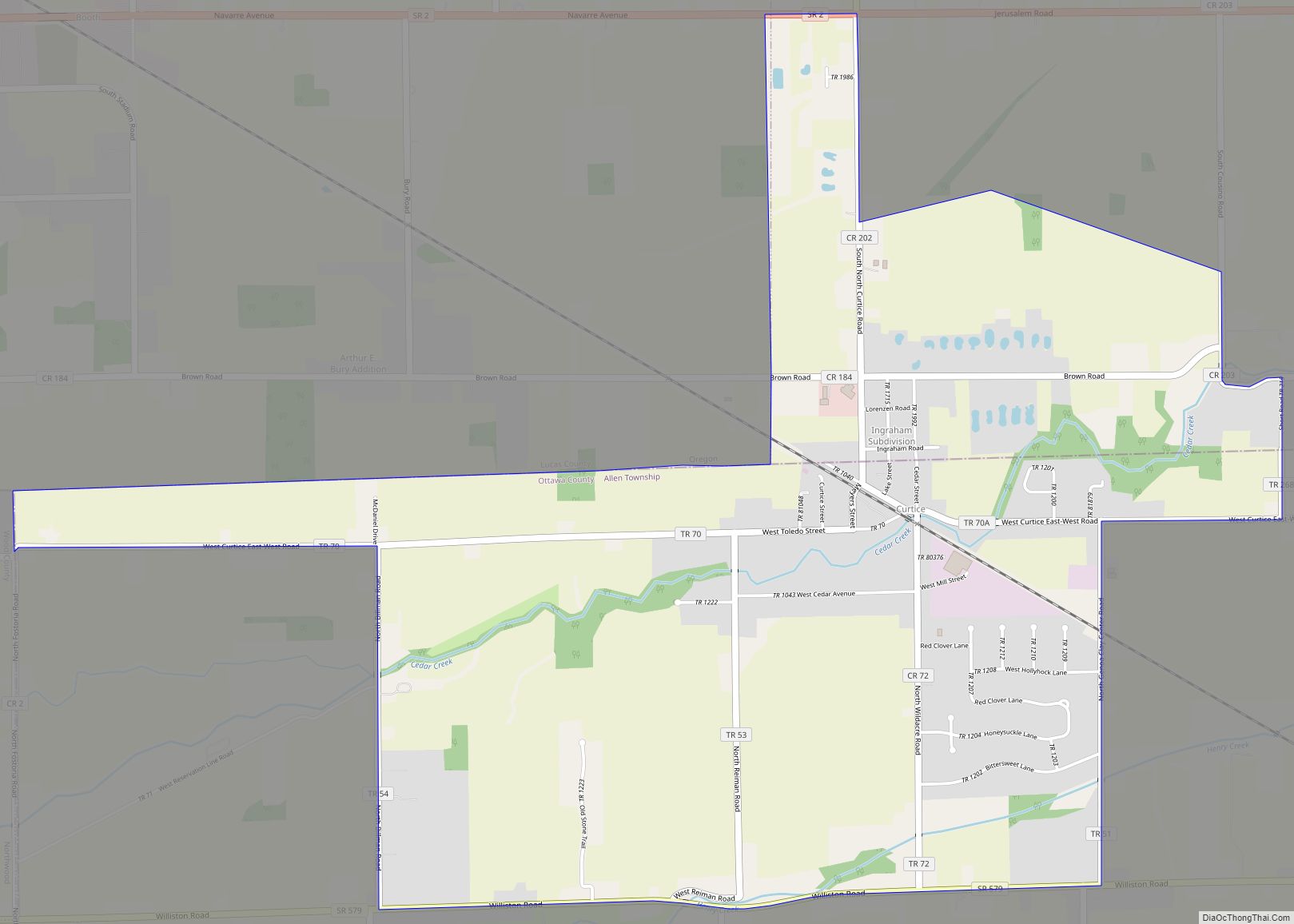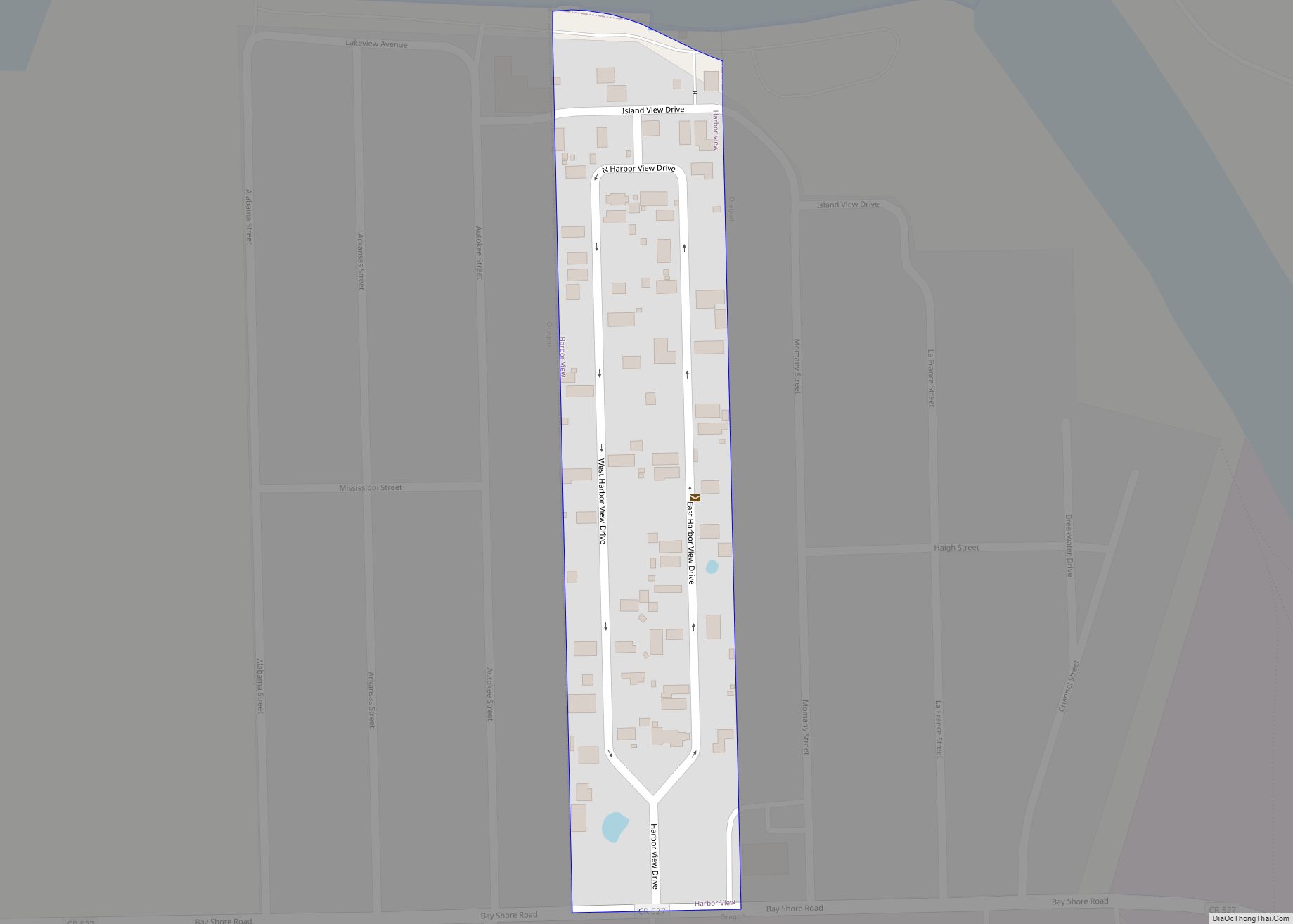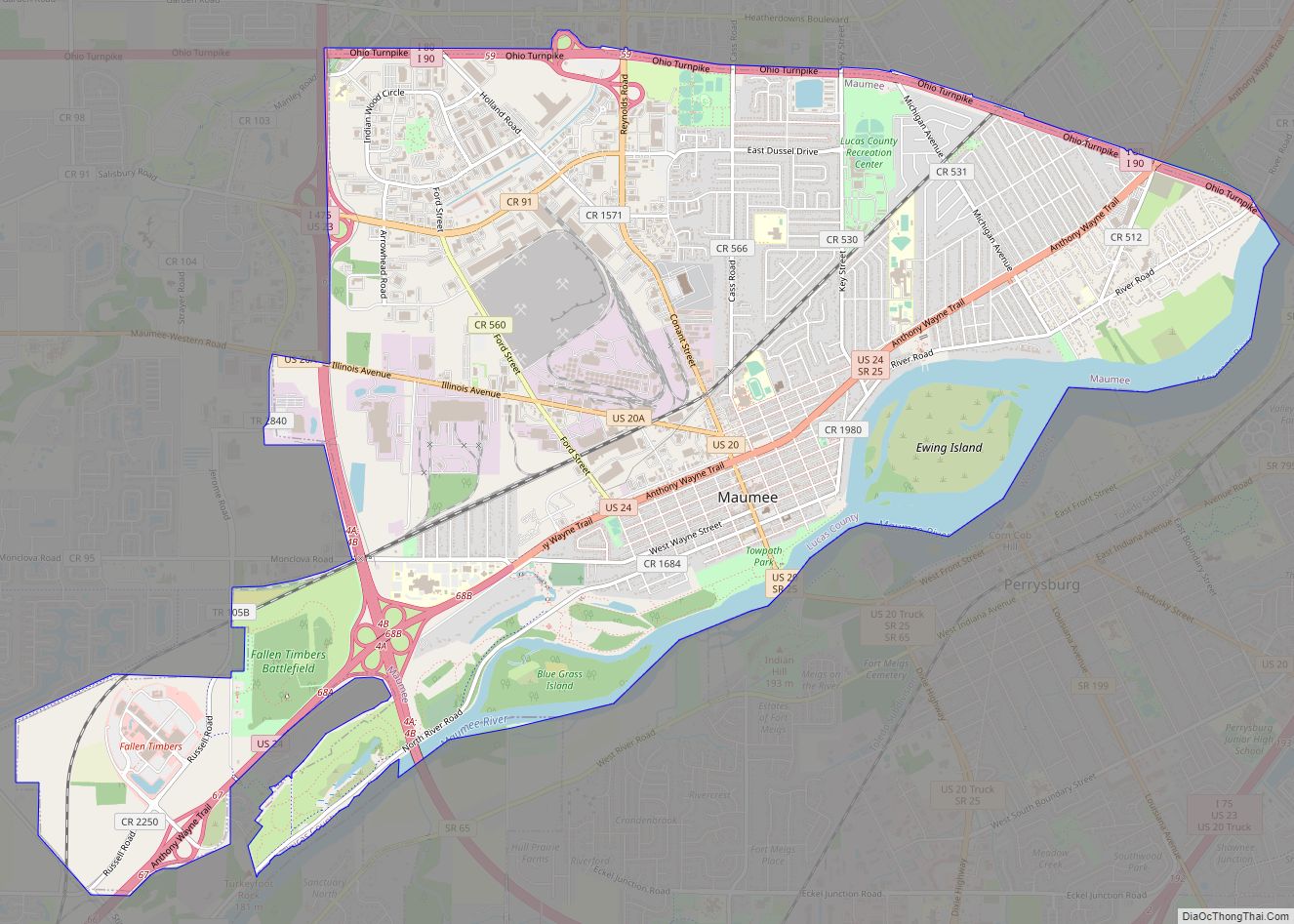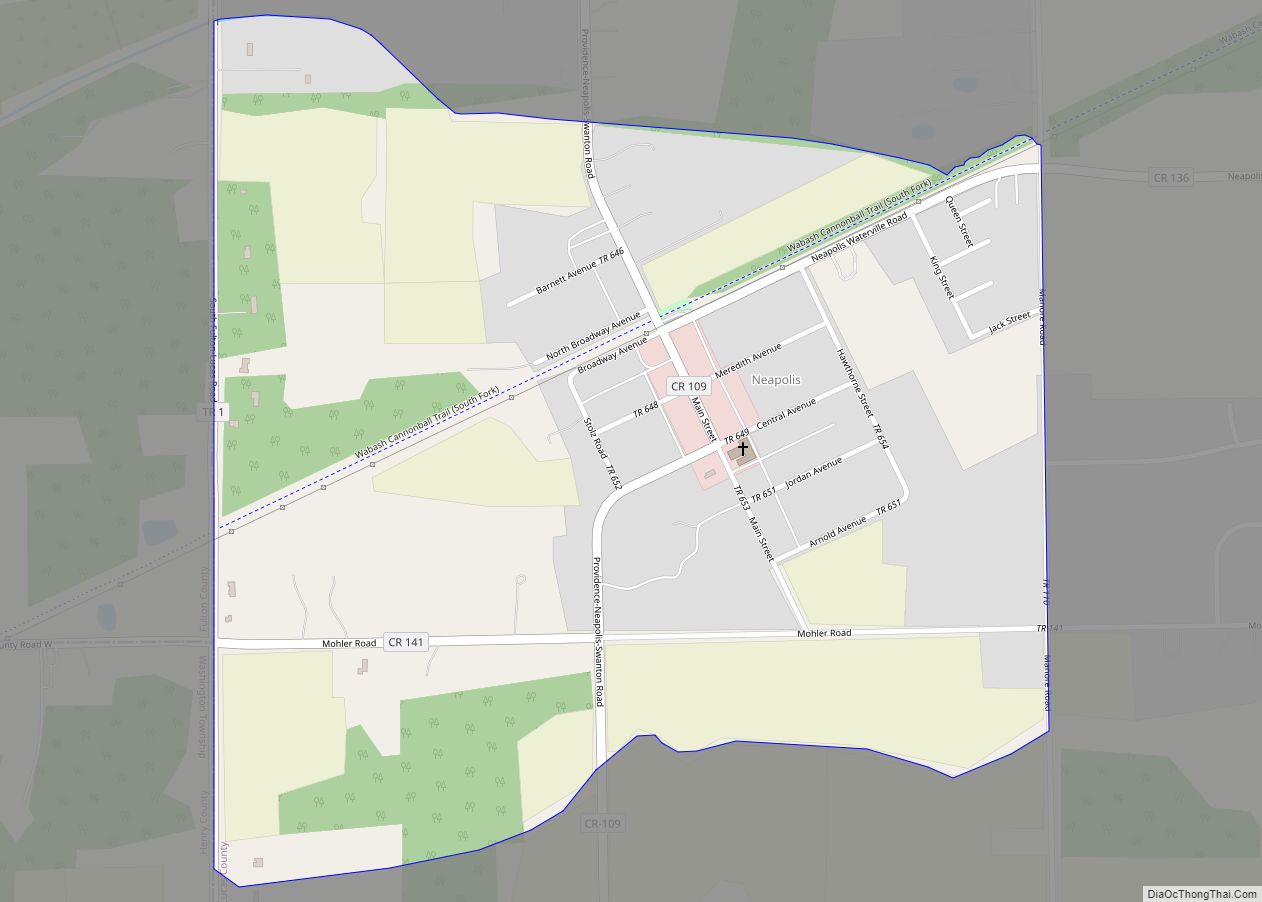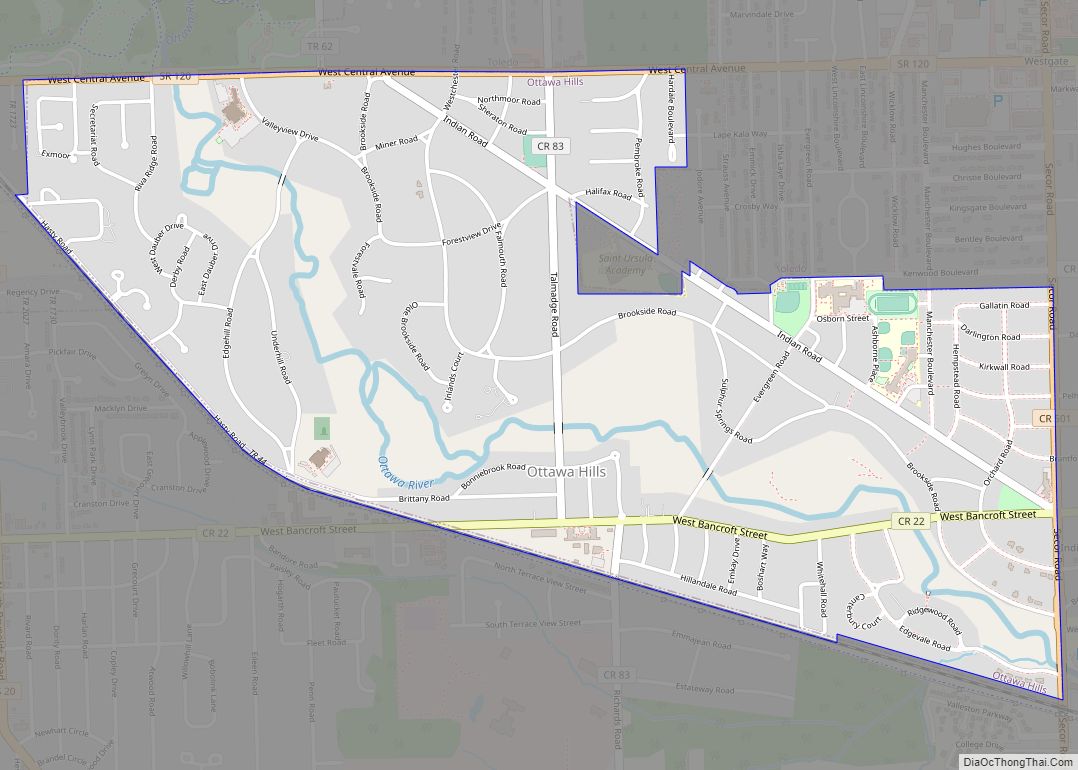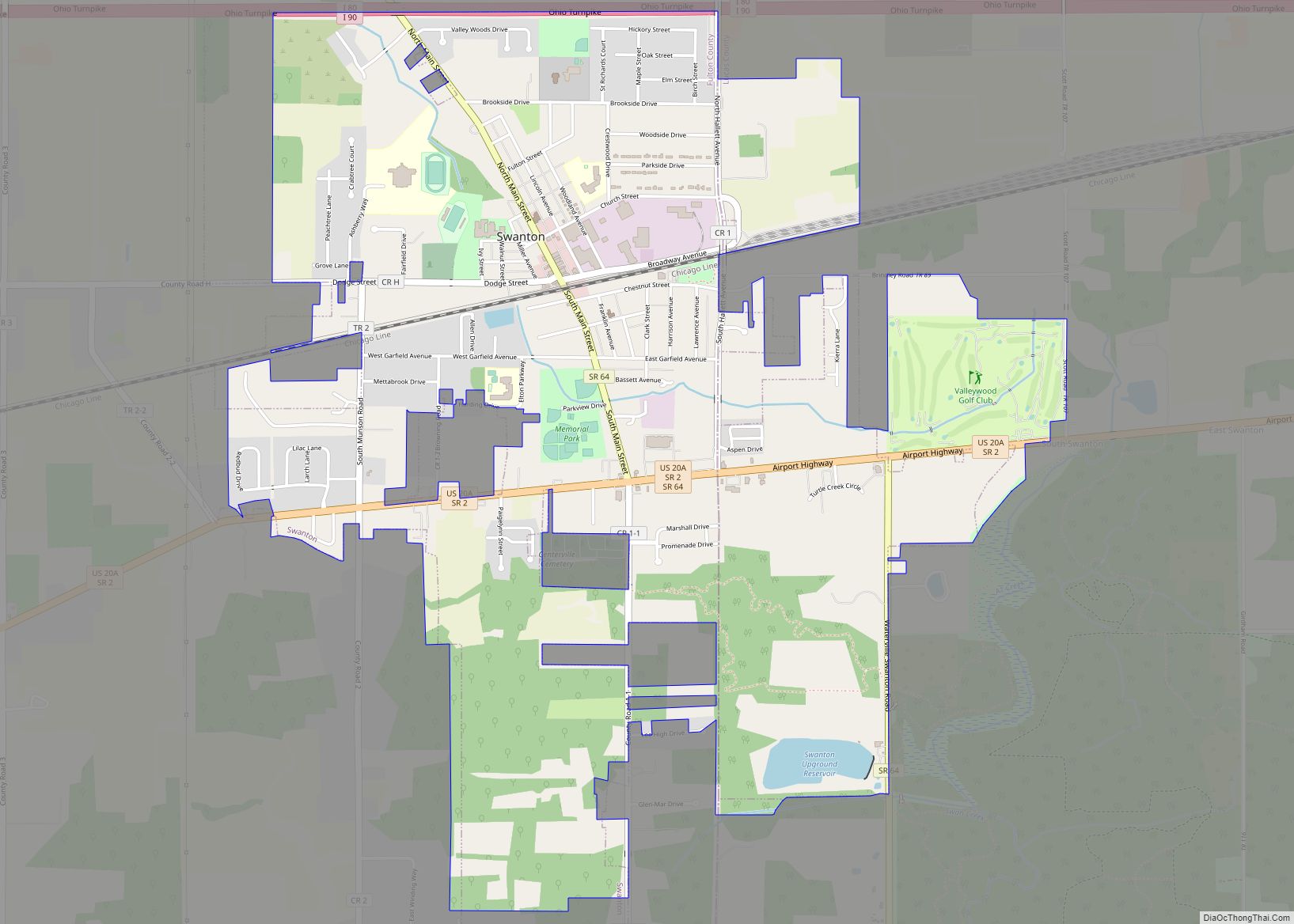Maumee (/mɔːˈmiː/ maw-MEE) is a city in Lucas County, Ohio, United States. Located along the Maumee River, it is about 10 miles southwest of Toledo. The population was 14,286 at the 2010 census. Maumee was declared an All-America City by the National Civic League in June 2006.
| Name: | Maumee city |
|---|---|
| LSAD Code: | 25 |
| LSAD Description: | city (suffix) |
| State: | Ohio |
| County: | Lucas County |
| Elevation: | 633 ft (193 m) |
| Total Area: | 10.79 sq mi (27.93 km²) |
| Land Area: | 10.04 sq mi (26.02 km²) |
| Water Area: | 0.74 sq mi (1.92 km²) |
| Total Population: | 13,896 |
| Population Density: | 1,383.37/sq mi (534.11/km²) |
| ZIP code: | 43537 |
| Area code: | 419/567 |
| FIPS code: | 3948342 |
| GNISfeature ID: | 1061485 |
| Website: | www.maumee.org |
Online Interactive Map
Click on ![]() to view map in "full screen" mode.
to view map in "full screen" mode.
Maumee location map. Where is Maumee city?
History
In pre-colonial times, Native Americans (notably the Ottawa) began using the rich resources at the present site of Maumee, Ohio, in the Maumee River valley. Throughout much of the eighteenth century, French, British and American forces struggled for control of the lower Maumee River as a major transportation artery linking East and West through Lake Erie.
Following the American Revolutionary War, Native Americans of the region, including the Odawa, Ojibwe and Potawatomie, and Shawnee, made alliances in what became called the Northwest Territory by the United States, which claimed it from the British after gaining independence. The Northwest Indian War was a series of conflicts from 1785 through 1795 between these nations and the US; it ended with a decisive American victory over the British and their Native American allies at the Battle of Fallen Timbers at Maumee in 1794. Maumee is the site of Gen. “Mad” Anthony Wayne’s final fort, Fort Deposit, built in Aug. 1794 on his way to the battle of Fallen Timbers. Together with the conclusion of the War of 1812, which preserved most US territory, the end of warfare and defeat of the Native Americans opened the way for American expansion in present-day Ohio. Promoters arrived who were eager to make a fortune in selling and developing western lands.
In 1817 a town plat was laid out at the Foot of the Rapids of the Maumee River, and within a decade, the settlement was gaining recognition as a major trans-shipment point connecting Lake Erie and the land to the west. The opening of the Erie Canal in 1825 in New York State stimulated migration to Ohio, as it connected Great Lakes communities to the Hudson River and port of New York City. Completion of the Wabash and Erie Canal in 1840 further stimulated the economy. Jessup Scott, a noted town promoter, predicted that Maumee would become the “great city of the West,” surpassing all rivals. By mid-century Maumee was a flourishing center of river trade, commerce and shipbuilding. Nearly twenty mercantile companies crowded the three miles (5 km) of ship docks and competed for the retail and wholesale trade.
In 1840 Maumee was designated as the county seat; lawyers came from miles around to practice in the imposing Greek Revival Lucas County Courthouse erected by private subscription. Court days were a time of trade and commerce, as well. The federal custom house and post office also were located in Maumee.
Dreams of greatness began to fade in the 1850s, when ships too large to navigate the river were introduced for use in the Great Lakes. In addition, the railroad provided faster and cheaper means of transportation than river traffic and drew off business. As the population expanded westward, Maumee lost the county seat in 1854.
Nearly a century later, in the 1970s, Maumee developed an economic renaissance. Today the city is one of the largest business centers in Northwest Ohio. Together, Arrowhead Business Park and Maumee’s historic business community contribute to the 30,000 plus jobs in the community. Maumee has expanded its original boundaries, and the population has grown to more than 13,700 residents. Maumee’s neighborhoods retain their small town flavor; in addition, many historic homes and buildings of the early residents still stand along the tree-lined streets of the architectural districts.
Maumee Road Map
Maumee city Satellite Map
Geography
Maumee is located at 41°34′14″N 83°39′9″W / 41.57056°N 83.65250°W / 41.57056; -83.65250 (41.570545, -83.652503). It is about 11 miles upriver of Toledo, which is at the mouth of the Maumee River on Maumee Bay. This is a roughly triangle-shaped city. Its borders are formed by Interstate 80/90 to the north, to the west by Interstate 475/U.S. Route 23, and to the southeast by the Maumee River. It is just downriver from Waterville.
According to the United States Census Bureau, the city has a total area of 10.61 square miles (27.48 km), of which 9.89 square miles (25.61 km) is land and 0.72 square miles (1.86 km) is water.
See also
Map of Ohio State and its subdivision:- Adams
- Allen
- Ashland
- Ashtabula
- Athens
- Auglaize
- Belmont
- Brown
- Butler
- Carroll
- Champaign
- Clark
- Clermont
- Clinton
- Columbiana
- Coshocton
- Crawford
- Cuyahoga
- Darke
- Defiance
- Delaware
- Erie
- Fairfield
- Fayette
- Franklin
- Fulton
- Gallia
- Geauga
- Greene
- Guernsey
- Hamilton
- Hancock
- Hardin
- Harrison
- Henry
- Highland
- Hocking
- Holmes
- Huron
- Jackson
- Jefferson
- Knox
- Lake
- Lake Erie
- Lawrence
- Licking
- Logan
- Lorain
- Lucas
- Madison
- Mahoning
- Marion
- Medina
- Meigs
- Mercer
- Miami
- Monroe
- Montgomery
- Morgan
- Morrow
- Muskingum
- Noble
- Ottawa
- Paulding
- Perry
- Pickaway
- Pike
- Portage
- Preble
- Putnam
- Richland
- Ross
- Sandusky
- Scioto
- Seneca
- Shelby
- Stark
- Summit
- Trumbull
- Tuscarawas
- Union
- Van Wert
- Vinton
- Warren
- Washington
- Wayne
- Williams
- Wood
- Wyandot
- Alabama
- Alaska
- Arizona
- Arkansas
- California
- Colorado
- Connecticut
- Delaware
- District of Columbia
- Florida
- Georgia
- Hawaii
- Idaho
- Illinois
- Indiana
- Iowa
- Kansas
- Kentucky
- Louisiana
- Maine
- Maryland
- Massachusetts
- Michigan
- Minnesota
- Mississippi
- Missouri
- Montana
- Nebraska
- Nevada
- New Hampshire
- New Jersey
- New Mexico
- New York
- North Carolina
- North Dakota
- Ohio
- Oklahoma
- Oregon
- Pennsylvania
- Rhode Island
- South Carolina
- South Dakota
- Tennessee
- Texas
- Utah
- Vermont
- Virginia
- Washington
- West Virginia
- Wisconsin
- Wyoming
